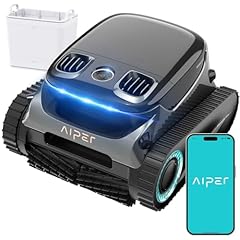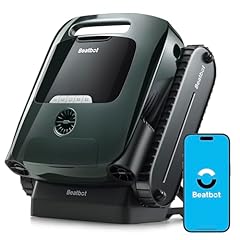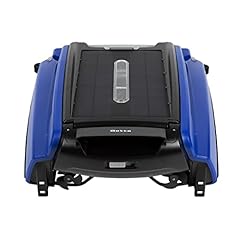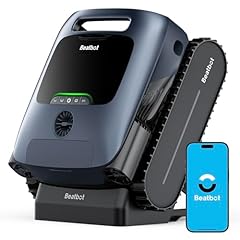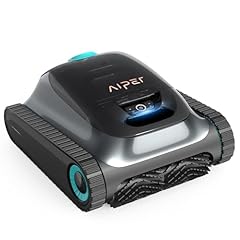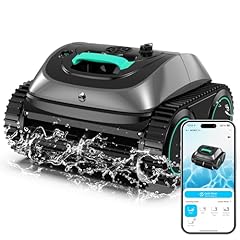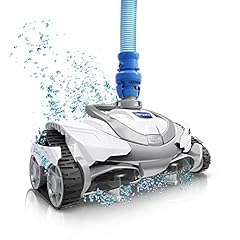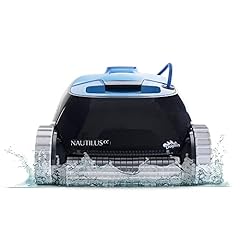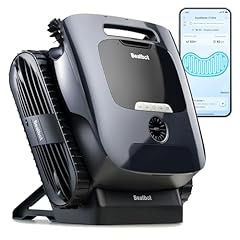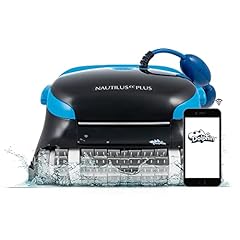-
1
Best Overall Efficient smart navigation for thorough cleaning.
Efficient smart navigation for thorough cleaning. Long-lasting 180-minute battery life.
Long-lasting 180-minute battery life. Ideal for large in-ground pools.
Ideal for large in-ground pools. -
2
Hot Deal Efficient 5-in-1 cleaning capability.
Efficient 5-in-1 cleaning capability. Remote navigation for easy control.
Remote navigation for easy control. Skims water surface and clarifies water.
Skims water surface and clarifies water. -
3
Best Affordable Operates without cords or hassle.
Operates without cords or hassle. Eco-friendly, uses solar power.
Eco-friendly, uses solar power. Effective at removing debris efficiently.
Effective at removing debris efficiently. -
4
 Cordless design makes pool cleaning hassle-free.
Cordless design makes pool cleaning hassle-free. Intelligent path optimization ensures thorough cleaning.
Intelligent path optimization ensures thorough cleaning. 5-in-1 functionality covers multiple cleaning needs.
5-in-1 functionality covers multiple cleaning needs. -
5
Popular Effortless cleaning with cordless operation.
Effortless cleaning with cordless operation. Smart navigation for thorough pool coverage.
Smart navigation for thorough pool coverage. Compact design for easy storage and handling.
Compact design for easy storage and handling. -
6
 Long-lasting 150-minute cleaning time.
Long-lasting 150-minute cleaning time. Smart app for easy control.
Smart app for easy control. Effective auto wall and waterline cleaning.
Effective auto wall and waterline cleaning. -
7
 Smart navigation ensures thorough pool cleaning.
Smart navigation ensures thorough pool cleaning. Energy efficient for lower power consumption.
Energy efficient for lower power consumption. Halo technology simplifies debris removal.
Halo technology simplifies debris removal. -
8
 Efficiently climbs walls for thorough pool cleaning.
Efficiently climbs walls for thorough pool cleaning. Easy-to-access top load filter system.
Easy-to-access top load filter system. Suitable for both above-ground and in-ground pools.
Suitable for both above-ground and in-ground pools. -
9
 Efficient AI-powered pool mapping for thorough cleaning.
Efficient AI-powered pool mapping for thorough cleaning. Multi-level platform cleaning for versatile use.
Multi-level platform cleaning for versatile use. Superior debris detection enhances cleaning precision.
Superior debris detection enhances cleaning precision. -
10
 Effortlessly connects to Wi-Fi for remote control.
Effortlessly connects to Wi-Fi for remote control. Efficiently climbs walls for thorough cleaning.
Efficiently climbs walls for thorough cleaning. Suitable for pools up to 50 feet.
Suitable for pools up to 50 feet.
Overview of Pool Vacuum Cleaner
We get it, you want to spend your summer days floating on an inflatable swan, not skimming leaves off your pool. That’s where a well-chosen pool vacuum cleaner swoops in to save your sunny days. With an army of pool cleaners battling it out in the market, how do you pick the one that will make your pool sparkle while you sit back with a cool drink? We’ve done the deep dive for you, scrutinizing everything from suction power to energy efficiency, and ease of use to durability. We’ve even applied a rigorous MECE (Mutually Exclusive, Collectively Exhaustive) analysis to ensure no stone (or pebble) is left unturned. Our top picks below cater to a variety of needs, so whether you own a mini plunge pool or an Olympic-size swimmer’s paradise, we’ve found the perfect pool vacuum cleaner for you. Say goodbye to manual labor and hello to automated poolside bliss.Top Pool Vacuum Cleaner
• AIPER Scuba S1 Pro Robotic Pool Cleaner• Beatbot AquaSense 2 Pro Pool Vacuum• Betta SE Solar Pool Skimmer CleanerFAQ
Q: What are the key factors to consider when buying a pool vacuum cleaner?
A: When buying a pool vacuum cleaner, consider factors like the type of pool (above or in-ground), the size and shape of the pool, the ease of setup and operation, and the type of debris commonly found in the pool. Looking for a cleaner that suits your specific needs will ensure efficient cleaning.
Q: How does a pool vacuum cleaner work?
A: A pool vacuum cleaner works by using suction to pull water into a filter system, trapping dirt and debris. The clean water is then returned to the pool. Some models are automatic and move around the pool on their own, while others require manual operation.
Q: What are the different types of pool vacuum cleaners?
A: There are three main types of pool vacuum cleaners: manual, automatic, and robotic. Manual cleaners are the most affordable but require the most work. Automatic cleaners are mid-range, require less effort, and operate when the pool pump is running. Robotic cleaners are the most advanced and efficient, but also the most expensive.
Q: How can I maximize the lifespan of my pool vacuum cleaner?
A: To maximize the lifespan of your pool vacuum cleaner, it's important to clean it regularly, avoid cleaning large debris that could damage the system, and store it properly when not in use. Regular maintenance can significantly extend the life of your cleaner.
Q: Can a pool vacuum cleaner clean all types and sizes of debris?
A: Most pool vacuum cleaners are designed to handle small to medium-sized debris like dirt, leaves, and small pebbles. Large debris or heavy amounts of sand may require a cleaner with a more powerful suction or a specialized pool vacuum cleaner. Always check the manufacturer's specifications to ensure the cleaner is suitable for your pool's needs.

